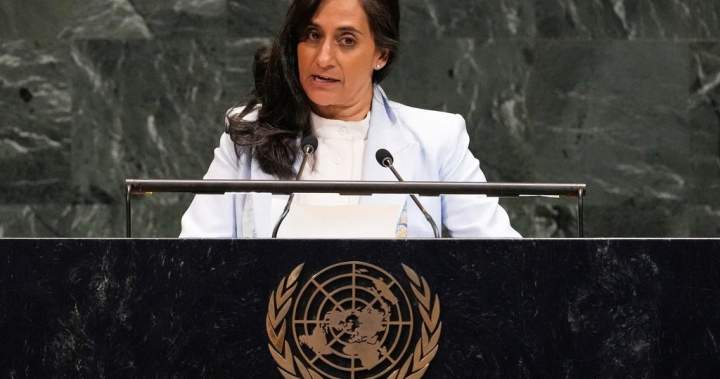Global Affairs Canada says deteriorating stability worldwide is causing a massive expansion in the work required to protect Canadians abroad, with the department warning Foreign Affairs Minister Anita Anand that Canadians might need to pay more and expect less.
That’s according to the briefing binder prepared for Anand when she took on the role in May. Across hundreds of pages, the binder details some of the eight Canadians facing the death penalty abroad, and the geopolitical hot spots where embassies have scrambled to evacuate citizens and their families.
“While you may expect to focus on international policy, consular work will also occupy a significant amount of your time,” the department warned Anand.
“Canadians’ expectations are not anticipated to abate, and the minister of foreign affairs has a visible role in managing consular crises and demands for assistance.”
Global Affairs Canada said it has had to deploy evacuation personnel to extract Canadians from crisis situations much more frequently than before, up 3.4 times over the past five years.
“Increased travel, diversity of Canada’s population, geopolitical instability, war and civil unrest, earthquakes and climate-related events are all factors that have upped the volume, complexity and resource demands of consular work,” the binder reads.
It also notes that GAC is increasingly asked to help not just citizens but also permanent residents and their relatives.
That’s left the department with a major financial shortfall, in part because the $25 fee for consular services charged for all adult passports hasn’t been adjusted since 2013, including with the introduction of the 10-year passport.
“The gap between revenues and costs continues to widen year over year, which places a strain on departmental resources,” including when Canadians sue over consular treatment.

Get breaking National news
For news impacting Canada and around the world, sign up for breaking news alerts delivered directly to you when they happen.
“GAC is unable to cover the costs of larger, prolonged crises,” the binder warns. The department is crafting a plan to ensure what it calls “sustainable crisis funding.”
The binder notes that both demand and precedents from past crises have meant “high financial costs” that might need to be controlled.
“Calibrating and managing expectations of service delivery may be warranted.”
In the fiscal year ending in March 2024, Global Affairs Canada opened 7,208 consular cases, which can include issues like severe illness and child abductions. The department also provided 271,340 routine services to Canadians abroad such as issuing passports or citizenship certificates.
Consular issues accounted for roughly 40 per cent of the department’s 3,358 media inquiries in 2024.
The rising costs include assisted departures from gang chaos in Haiti, war in the Middle East and violent protests in New Caledonia. The consular response for Haiti in 2024 “amounted to nearly $10 million” and helped 681 Canadians leaving the country.
GAC allocated another $40 million for evacuations and preparations for possible evacuations in the Middle East.
In a written statement, Global Affairs Canada said it has helped 5,231 Canadians evacuate from various countries between March 2023 and March 2025. That includes 880 from the Gaza Strip, 1,627 from Israel, 462 from Sudan and 153 from Hawaii wildfires.
“We remain committed to providing timely and effective consular assistance to Canadians abroad, including during emergency situations,” wrote spokeswoman Samantha Lafleur.
The briefing documents note that as of May, Ottawa was aware of four Canadians on death row in the U.S., noting that “both the federal government and some state governments can impose death penalty sentences on various crimes.” It notes that U.S. President Donald Trump has directed the U.S. Justice Department to systematically seek the death penalty where possible.
In China, Abbotsford, B.C., native Robert Schellenberg was sentenced to death on drug-smuggling charges in 2019, despite Ottawa deeming his case to be arbitrary sentencing and advocating for clemency. The binder notes that China executed four Canadian citizens in early 2025.
As for India, the binder notes that the U.S. in April extradited Canadian citizen Tahawwur Hussain Rana to stand trial in India on charges relating to the 2008 Mumbai terrorist attacks. “If convicted of charges in India, he could face the death penalty,” the binder notes.
There were “up to 18 Canadians” detained in India as of April, including three in jail and 15 released on bail. As a snapshot, it notes that in the fiscal year ending in March 2024, “120 new (consular) cases were opened in India, dealing primarily with arrest, medical assistance, death, wellbeing/whereabouts, and children and family issues.”
Separately, a Feb. 13 report obtained by The Canadian Press through access-to-information laws shows that there were 993 Canadians in custody abroad. That report identifies three more death-penalty cases that weren’t listed in the May binder.
A document called the “monthly complex consular case update” presented to former prime minister Justin Trudeau said there were two death-penalty cases in Vietnam and one in the Democratic Republic of the Congo.
The document also noted “three potential death penalty cases: one in the U.S., as well as two in Trinidad and Tobago.” It is unclear whether the American case refers to Rana’s extradition to India.
Anand’s briefing binder notes that Canada is also trying to rally countries to instil norms that prevent hostage diplomacy.
After China detained two Canadian citizens for more than 1,000 days, Canada launched the “arbitrary detention initiative” in 2021.
GAC also added the title of “senior official for hostage affairs” to the bureaucrat who was already in charge of overseeing consular cases.
Meanwhile, Anand’s office says MP Mona Fortier is her assistant for consular cases. Unlike under the Trudeau government, none of the four parliamentary secretaries that Prime Minister Mark Carney appointed, including Fortier, hold a public title about consular matters.
Death row, detainment and geopolitics cause surge in Canadian consular cases





